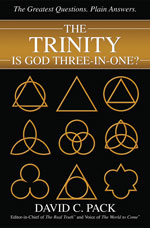Throughout history, scholars such as “grammarians, lexicographers, and linguists” have sought to discredit the Bible’s authority as the inspired Word of God. They resort to playing “word games,” much as did the Pharisees of Christ’s day. Because such people resent the idea of a greater Being claiming Supreme Authority over their lives, they “strain at gnats and swallow camels” (Matt. 23:24). While some scholars who espouse such beliefs are sincere, and are not seeking to discredit the Bible, their views are misguided nonetheless, leading to unnecessary confusion and division among professing Christians.
Concerning Genesis 1:2, consider the following:
God is not the author of confusion (I Cor. 14:33), and His word does not return to Him void (Isa. 55:11). Isaiah 45:18 sheds even more light on the subject: “For thus says the Lord that created the heavens; God Himself that formed the earth and made it; He has established it, He created it not in vain, He formed it to be inhabited: I am the Lord; and there is none else.” Also notice that God says that Lucifer, who later rebelled and became Satan, was “perfect in your ways from the day that you were created, till iniquity was found in you” (Ezek. 28:15). This shows that Satan [originally Lucifer] was not created in his present state. He rebelled, and became Satan the devil. (Notice Isaiah 14:12-15.)
Also notice Job 38:7: “[Where were you, Job] when the morning stars sang together, and all the sons of God shouted for joy?” Why would the angels (“morning stars,” “sons of God”) have shouted for joy if God had created everything “without form and void”? This also shows that, prior to Lucifer’s rebellion, there was unity among the angels.
But let’s assume for a moment that “was” in Genesis 1:2 means “was” (if it is simplistic to believe that it means “became”). In the book of Isaiah, we see that God’s Word is like a jigsaw puzzle, written “here a little, there a little” (28:10). Notice Genesis 5:24: “And Enoch walked with God: and he was not; for God took him.” What does this verse mean? Does it imply that, while Enoch “was not,” he “walked with God”? That, perhaps, an imaginary phantom by the name of Enoch “walked with God”? No. It shows that Enoch later came to be in a certain state—in this case, “God took him.”
In conclusion, one does not have to be a grammarian, historian or scholar to understand the Bible. In fact, the Bible shows that those who study it for the simplicity it contains (I Cor. 1:27; II Cor. 11:3; John 4:23), without adding their own “theological” conjecture, are the ones God is calling and working with (John 6:44, 65).


















